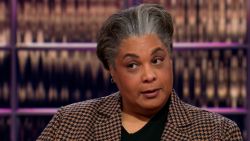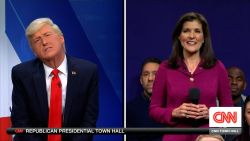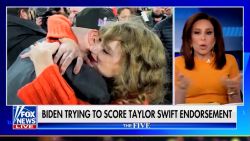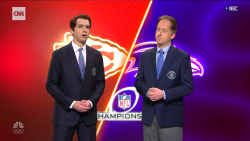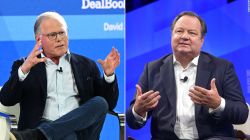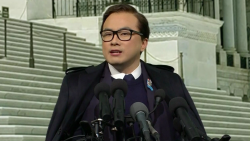The Justice Department will have another chance this week to stop AT&T’s purchase of Time Warner, CNN’s parent company that has since been renamed WarnerMedia.
A three-judge panel will hear oral arguments on Thursday from attorneys representing the Justice Department and AT&T. The government’s lawyers will try to convince the judges that a lower court’s logic for approving of the $85 billion merger in June was flawed.
Each side will have 30 minutes to make its case. The Justice Department is granting 10 minutes of its time to a group of 27 antitrust scholars called an “amicus curiae” to make the case for the government’s side.
There will be no witnesses to call or new evidence to introduce. The case will hinge solely on the evidence and hours of testimony presented during the six week trial that started in March.
What does each side claim?
The Justice Department has argued that by owning WarnerMedia, which includes stalwart brands like HBO, WarnerBros and TBS, AT&T would have “both the incentive and the ability to raise its rivals’ costs and stifle growth of innovative, next-generation entrants that offer attractive alternatives to AT&T/DirecTV’s legacy pay-TV model—all to the detriment of American consumers.”
AT&T, the Justice Department claimed, would have greater bargaining leverage because the company could threaten to “black out” Time Warner content – pulling it from rival distributors during negotiations – because customers would drop their current providers and switch to AT&T services like DirecTV in order to watch its content. The Justice Department alleged that AT&T would also have the power to raise the prices its competitors pay for Time Warner’s content.
AT&T and Time Warner argued during the trial that they have no incentive to trigger a “black out” because they rely on subscriber fees and advertisements to make money, and dropping a distributor would cause their networks too much financial harm. They also claimed that they need the merger to compete with the likes of Netflix, Google and Facebook, and to bring cost savings and new innovations to their customers.
District Court Judge Richard Leon ruled in June that the merger could proceed with no conditions — ripping apart the government’s case in a 172-page opinion.
Each side has already submitted lengthy briefs ahead of Thursday’s oral arguments. The Justice Department claimed in its brief that Judge Leon committed “fundamental errors of economic logic and reasoning” in his decision and “discarded the economics of bargaining.” Lawyers argued that Leon both “misunderstood” and “failed to apply the foundational principle of corporate-wide profit maximization” when he found that the government failed to prove that the merger would substantially harm competition.”
In its brief, AT&T wrote that Leon “well understood the economics” underlying the Justice Department’s theory. Leon accepted much of the government’s analysis, AT&T wrote, but evidence and testimony during the trial “led the court to reject DOJ’s prediction that Time Warner would command a higher wholesale price for its most popular networks simply by being affiliated with AT&T.”
What about Trump?
President Trump’s open animus toward CNN has loomed large over the merger, but his name was not invoked during the trial. Judge Leon blocked discovery on certain communications between the White House and the Justice Department, and AT&T dropped the argument that Trump singled out CNN’s parent company for scrutiny.
But in their appeals brief, AT&T reminded the court of what Trump said when he was running for president, citing a press release from the Trump campaign that said the then-candidate would block the merger “and thus the wildly anti-Trump CNN.”
“[M]any press outlets [questioned] whether the White House had improperly influenced DOJ’s decision to bring the case,” AT&T wrote in its brief.
Who are the judges?
A panel of three judges will rule on the appeal – Judith W. Rogers, Robert L. Wilkins and David B. Sentelle. They were appointed by Presidents Clinton, Obama and Reagan respectively.
When it comes to antitrust laws, liberals call for more government intervention in mergers, while conservatives prefer a hands-off approach. Though it’s hard to determine how a judge will rule based solely on which president nominated them, a judge’s prior rulings and writings can give some insight on how they approach such cases.
On factual based decisions such as the AT&T-Time Warner case, the appellate court tends to defer to the District Court judge, said John Lopatka, a professor of law at Penn State University and co-author of a book about the blockbuster Microsoft antitrust case. Lopatka signed onto an amicus brief supporting Leon’s decision to allow the merger.
“If it’s a factual dispute, the tie goes to the judge. So it is implicit in that standard the judge’s decision, in factual findings, would have to be both clearly erroneous and prejudicial for the appellate court to overturn the decision,” Lopatka said.
Even if the appellate court finds that Leon erred in some instances, there would have to be an egregious number of errors for the appellate court to reverse the decision, Lopatka said.
“The issue for the panel is going to be, in the factual determinations by the district court, are they clearly erroneous? Or is there enough in the record that one would say, ‘given some deference we owe the district court we might come to a different conclusion but we can’t say district court was clearly in error,” Lopatka added.
What happens next?
No decision will be made on Thursday. The judges will take a few weeks to write their opinion, which both sides expect to come early next year.
The court of appeals is usually the final decision on cases, though sometimes judges will send a case back to the original judge, in this case Judge Leon, with special instructions to remedy whatever issues the appeals court may have found.
If the appeals court affirms Leon’s judgment, allowing the two companies to stay merged, the Justice Department could ask the appeals court to re-hear the case “en banc” with every judge from the appeals court.
If the appeals court agrees with the Justice Department, the appeals court could send the case back to Leon with instructions to undo the merger.
Either party could also ask the Supreme Court to hear the case, though that’s not a guarantee the high court will take the case. There is some desire in the legal community for the Supreme Court to rule on a vertical merger case with today’s standards, since the court hasn’t heard such a case since the 1970s.



